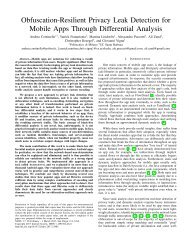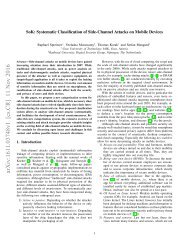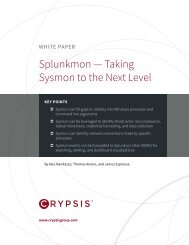You also want an ePaper? Increase the reach of your titles
YUMPU automatically turns print PDFs into web optimized ePapers that Google loves.
list <str<strong>on</strong>g>of</str<strong>on</strong>g> all <str<strong>on</strong>g>of</str<strong>on</strong>g> its running threads and immediately place each thread (outside <str<strong>on</strong>g>of</str<strong>on</strong>g> its main thread) in<br />
a suspended state. Next, Stage 2 modifies <str<strong>on</strong>g>the</str<strong>on</strong>g> scheduling policies for <str<strong>on</strong>g>the</str<strong>on</strong>g> main thread to fur<str<strong>on</strong>g>the</str<strong>on</strong>g>r<br />
increase <str<strong>on</strong>g>the</str<strong>on</strong>g> probability that <str<strong>on</strong>g>the</str<strong>on</strong>g> UAF exploit will not face competiti<strong>on</strong> for <str<strong>on</strong>g>the</str<strong>on</strong>g> memory in<br />
questi<strong>on</strong>.<br />
An additi<strong>on</strong>al step is performed in <str<strong>on</strong>g>the</str<strong>on</strong>g> 64-bit versi<strong>on</strong> <str<strong>on</strong>g>of</str<strong>on</strong>g> Stage 2. With <str<strong>on</strong>g>the</str<strong>on</strong>g> thread scheduler<br />
modificati<strong>on</strong>s complete, 64Stage2 generates up to 1000 threads. Each thread c<strong>on</strong>sists <str<strong>on</strong>g>of</str<strong>on</strong>g> a<br />
single tight loop that merely wait for a global variable to drop below a predefined value (in this<br />
case, <str<strong>on</strong>g>the</str<strong>on</strong>g> value is less than 0). This behavior is intended to ensure (or, at least, significantly<br />
increase <str<strong>on</strong>g>the</str<strong>on</strong>g> chances) that no additi<strong>on</strong>al threads may spawn that can compete for <str<strong>on</strong>g>the</str<strong>on</strong>g> UAF’s<br />
targeted memory.<br />
Establishing Communicati<strong>on</strong> Channel (32-Bit)<br />
32Stage2 generates ano<str<strong>on</strong>g>the</str<strong>on</strong>g>r pipe set using <str<strong>on</strong>g>the</str<strong>on</strong>g> pipe command, reusing <str<strong>on</strong>g>the</str<strong>on</strong>g> same variable that<br />
held <str<strong>on</strong>g>the</str<strong>on</strong>g> original pipe set 32Stage2 generated. This acti<strong>on</strong> is immediately followed by calls to<br />
host_get_clock_service in order to get access to <str<strong>on</strong>g>the</str<strong>on</strong>g> real-time and battery clocks. As with<br />
<str<strong>on</strong>g>the</str<strong>on</strong>g> pipe set, <str<strong>on</strong>g>the</str<strong>on</strong>g> calls to host_get_clock_service reuse <str<strong>on</strong>g>the</str<strong>on</strong>g> same variables from <str<strong>on</strong>g>the</str<strong>on</strong>g><br />
previous calls to host_get_clock_service that gain a port to <str<strong>on</strong>g>the</str<strong>on</strong>g> various clocks.<br />
The previous generati<strong>on</strong> <str<strong>on</strong>g>of</str<strong>on</strong>g> <str<strong>on</strong>g>the</str<strong>on</strong>g> pipe set and <str<strong>on</strong>g>the</str<strong>on</strong>g> clock ports were necessary because <str<strong>on</strong>g>the</str<strong>on</strong>g>se<br />
items are used later for kernel manipulati<strong>on</strong> and if <str<strong>on</strong>g>the</str<strong>on</strong>g> kernel task port was available already,<br />
32Stage2 would simply skip <str<strong>on</strong>g>the</str<strong>on</strong>g> exploitati<strong>on</strong> process necessary to modify <str<strong>on</strong>g>the</str<strong>on</strong>g> kernel and instead<br />
modify <str<strong>on</strong>g>the</str<strong>on</strong>g> kernel directly through vm_write calls. However, if 32Stage2 does not have access<br />
to <str<strong>on</strong>g>the</str<strong>on</strong>g> kernel task port (<str<strong>on</strong>g>the</str<strong>on</strong>g> default case <strong>on</strong> a n<strong>on</strong>-jailbroken device), exploitati<strong>on</strong> is necessary in<br />
order to acquire such access. As part <str<strong>on</strong>g>of</str<strong>on</strong>g> this exploitati<strong>on</strong> process, 32Stage2 needs to have <str<strong>on</strong>g>the</str<strong>on</strong>g><br />
pipe set and clocks available prior to <str<strong>on</strong>g>the</str<strong>on</strong>g> exploit’s activati<strong>on</strong>, and thus <str<strong>on</strong>g>the</str<strong>on</strong>g> binary ensures that<br />
<str<strong>on</strong>g>the</str<strong>on</strong>g>y are available. While this is unnecessarily repetitive, it does serve to ensure that <str<strong>on</strong>g>the</str<strong>on</strong>g> critical<br />
objects are readily available.<br />
The 64-bit versi<strong>on</strong> <str<strong>on</strong>g>of</str<strong>on</strong>g> <str<strong>on</strong>g>the</str<strong>on</strong>g> Stage 2 binary does not need to perform this step, given that <str<strong>on</strong>g>the</str<strong>on</strong>g><br />
triggering mechanism used to ultimately call <str<strong>on</strong>g>the</str<strong>on</strong>g> functi<strong>on</strong> is little more than a redirecti<strong>on</strong> <str<strong>on</strong>g>of</str<strong>on</strong>g> an<br />
existing functi<strong>on</strong> pointer to a sysctl handler.<br />
Payload C<strong>on</strong>structi<strong>on</strong> and Kernel Inserti<strong>on</strong> (32-Bit)<br />
Without a means to modify kernel memory through <str<strong>on</strong>g>the</str<strong>on</strong>g> kernel port, 32Stage2 must leverage a<br />
vulnerability within <strong>iOS</strong> to gain access to <str<strong>on</strong>g>the</str<strong>on</strong>g> kernel. In order to perform this task, 32Stage2<br />
c<strong>on</strong>structs two data buffers: a 20-byte buffer c<strong>on</strong>taining <str<strong>on</strong>g>the</str<strong>on</strong>g> necessary overwrite data to modify<br />
<str<strong>on</strong>g>the</str<strong>on</strong>g> real-time and battery clocks and a 38-byte buffer c<strong>on</strong>taining a payload that runs a series <str<strong>on</strong>g>of</str<strong>on</strong>g><br />
ROP gadgets to install <str<strong>on</strong>g>the</str<strong>on</strong>g> clock handler overwrites. The two data buffers have <str<strong>on</strong>g>the</str<strong>on</strong>g> following<br />
layout after <str<strong>on</strong>g>the</str<strong>on</strong>g>ir c<strong>on</strong>structi<strong>on</strong>:<br />
Page 21
















